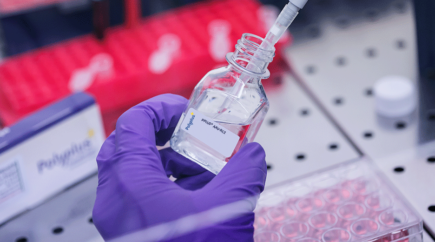pPLUS® AAV-RC range is a set of ready-to-use RepCap plasmids for AAV production of various serotypes through triple transfection. Optimized for use w...

Cell and Gene Therapy
#1 Leader in transfection for small to large scale viral vector production
Gold standard reagent
Optimized PEI-based transfection reagent for scalable viral vector production (both adherent and suspension systems)
Reproducible
Equivalent viral vector production yields guaranteed with 3 quality grades available - PEIpro®, PEIpro®-HQ and PEIpro®-GMP
GMP grade availability
Validated Manufacturing process following ICH Q7 guidelines, provided with full regulatory documentation
Residual test availability
Polyplus developed its own residual method detection to mitigate risks and ensure patient safety
| Product information | PEI-based reagent |
|---|---|
| Applications | Viral vector manufacturing using adherent and suspension HEK-293 derivative cells . |
| Number of transfections | 1 L of PEIpro® transfection reagent is sufficient to transfect on average 500 L of cell culture (using standard conditions) |
| Storage condition | Store PEIpro® at 5 °C ± 3°C. |
| Product documentation | Protocol |
| Regulatory documentation (PEIpro®-GMP only) | Certificate of compliance |
PEIpro® transfection reagent is the leading PEI-based DNA transfection reagent that offers flexibility and scalability to develop a robust and sustainable viral vector manufacturing process. PEIpro® benefits from extensive research development in PEI polymer chemistry and formulation to achieve highest transfection efficiency in both adherent and suspension cell culture systems. PEIpro® allows a smooth transition from initial process development to large scale manufacturing of therapeutic viral vectors with three quality grades available: PEIpro®, PEIpro®-HQ and PEIpro®-GMP. PEIpro®-GMP is the highest quality grade PEI-based reagent on the market and is provided with a full regulatory documentation to support drug approvals.
| Reference Number | Product | Amount of reagent |
|---|---|---|
| 101000017 | PEIpro® | PEIpro® 1.5 mL Vial |
| 101000033 | PEIpro® | PEIpro® 10 mL Bottle |
| 101000026 | PEIpro® | PEIpro® 100 mL Bottle |
| 101000029 | PEIpro® | PEIpro® 1 L Bottle |
| 101000052 | PEIpro®-HQ | PEIpro®-HQ 100 mL Bottle |
| 101000039 | PEIpro®-HQ | PEIpro®-HQ 1 L Bottle |
| 102000131 | PEIpro®-GMP | PEIpro®-GMP 10 x 10 mL Bottle (PETG) |
| 102000121 | PEIpro®-GMP | PEIpro®-GMP 100 mL Bottle (PETG) |
| 102000008 | PEIpro®-GMP | PEIpro®-GMP 1 L Bag (closed system) |
| 102000005 | ***NO DISPLAY*** PEIpro®-GMP | ***NODISPLAY*** |
| 115-0015 | 1.5 ml | ***NODISPLAY*** |
| 115-010 | 10 ml | ***NO DISPLAY*** |
| 115-100 | 100 ml | ***NO DISPLAY*** |
| 115-01L | 1 L | ***NO DISPLAY*** |
| 125-01L | ***NO DISPLAY*** 1 L bag | ***NO DISPLAY*** |
| 127-300 | ***NO DISPLAY*** 300 mL bag | ***NO DISPLAY*** |
| 126-100 | ***NO DISPLAY*** 100 mL bottle | ***NO DISPLAY*** |
| 126-10x10 | ***NO DISPLAY*** 10 x 10 mL bottles | ***NO DISPLAY*** |
| 102000001 | ***NO DISPLAY*** PEIpro®-GMP 1 L Bag | ***NO DISPLAY*** |
| 102000002 | ***NO DISPLAY*** PEIpro®-GMP 100 mL Bottle | ***NO DISPLAY*** |
| 301-100 | 100 ml | ***NO DISPLAY*** |
| 301-01L | 1 L | ***NO DISPLAY*** |